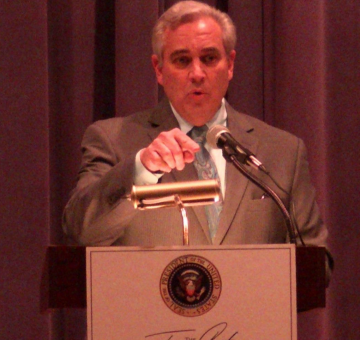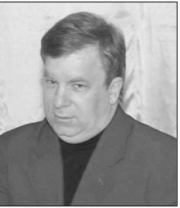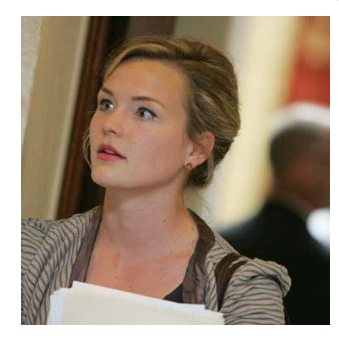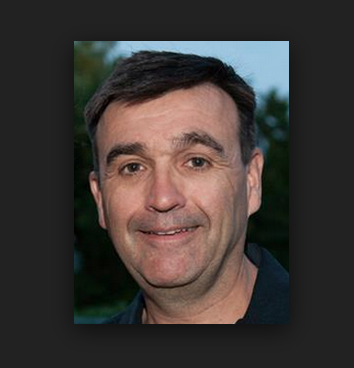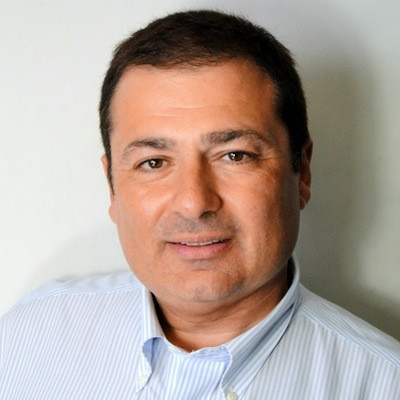“Scoundrels” Introducing Paul Caranci and Thomas Black’s Book on RI Political Corruption
Monday, December 12, 2016
Each week, GoLocalProv will publish a chapter of the book Scoundrels: Defining Corruption Through Tales of Political Intrigue in Rhode Island, by Paul Caranci and Thomas Blacke.
The book uses several infamous instances of political corruption in Rhode Island to try and define what has not been easily recognized , and has eluded traditional definition.
The book looks at and categorizes various forms of corruption, including both active and passive practices, which have negative and deteriorating affects on the society as a whole.
GET THE LATEST BREAKING NEWS HERE -- SIGN UP FOR GOLOCAL FREE DAILY EBLASTBuy the book by CLICKING HERE.
INTRODUCTION
In the year 2004 the Federal Bureau of Investigation began to seek indictments resulting from a lengthy investigation of Rhode Island officials known as Operation Dollar Bill. The ongoing investigation into corruption at the Rhode Island State House resulted in the indictment, resignation and imprisonment of one powerful state senator, the resignation of a Senate President, and the indictment, guilty plea and imprisonment of one former state representative who chaired the powerful House Committee on Corporations. The investigation also touched the business community where it resulted in the indictment, trial, guilty verdict and imprisonment of two high level employees of the Roger Williams Medical Center, an affiliate of the Roger Williams Hospital and subsequently, the dismissal of four long-time and high-level employees of Blue Cross/Blue Shield of RI. To avoid indictment, the companies themselves accepted millions of dollars in fines and agreed to cooperate with all aspects of the federal investigation.
Operation Dollar Bill is just one in a string of Rhode Island corruption scandals that have led to the imprisonment of governors, legislators, mayors, town administrators, council members and a host of other political operatives.
Rhode Island is a small state geographically. With a population of just over one million people, it is probable that most residents have a relationship with one of their elected officials, or at least know someone that does. It is a state in which political relationships have been described as incestuous, and that may be more true than not. Perhaps it is this closeness that tends to lead people in Rhode Island to believe that theirs is the most corrupt state in the union. Leslie Alan Horvitz, in “Corruption Reaches Fork in the Rhode – Political Corruption in Rhode Island,” noted, “Rhode Island may not be the most corrupt state in the country, but the electorate can be forgiven for thinking it is.”1 Horvitz continues, after a round of scandals in 1993, some crusaders called “for an entire overhaul of the government.” What they got was the RI Ethics Commission. In a final observation Horvitz noted, “If reform can succeed in Rhode Island, it can succeed anywhere.”
Certainly criticism of the ethics of Rhode Island elected officials may have never been more persistent, and while the Ethics Commission was deigned to alleviate political corruption, the organization’s objective has not even approached mission accomplished status as political corruption continues to flourish in this small state nearly unabated.
This book defines political corruption and uses Rhode Island stories to provide examples of the types of political corruption identified. It is impossible to assess Rhode Island’s corruption, or at least to fully grasp its impact on government and society as a whole, without first having at least a cursory discussion of what corruption is and how it is measured.
It is believed that political corruption is as old as government itself. One corruption scholar argues that it may be as old as organized human life! The Arthashastra, a 2400-year old text about the government of India, contains a writing authored by Kautilya, an advisor to India’s Maurya Empire founder Chadragupta Maurya. In it, Kautilya discusses how corruption becomes an inevitable component of the Kings maritime routes frequented by the importers of goods. His detailed description provides a meticulous explanation of the corruption that existed in the ancient world. He writes, in part, “…Just as it is impossible not to taste honey or poison that one may find at the tip of one’s tongue, so it is impossible for a government servant not to eat up at least a bit of the King’s revenue…. And there are about forty ways of embezzlement by the government servant.” India did not hold the monopoly on corrupt activities however. Rome, Greece, China and other government structures were besieged equally by the corrosive impact of corruption.
Government corruption has a denigrating effect on society. It clearly increases the cost of government and slows government response to an issue. It hampers economic development and growth, has a negative impact on tax rates and the rate of return on investments, undermines democracy and the civil society and increases the overall cynicism toward government, politics and public servants.
Despite its timeless nature and devastating impact on society, political corruption remains an elusive term that is very difficult to define. Describing political corruption as a cross-systematic, a cross-temporal and a cross cultural phenomenon, noted sociologist Robert Neild contends that corruption exists in all countries, at all times and under every form of government and may be considered the norm for most of human history. A cynical view for sure, but Neild’s contention might be regarded as prescient by observers of the American political system. Yet, political corruption exists at so many levels simultaneously, that academic definition remains elusive. The latter half of the 20th century marked the first time that any serious attempts were made to study political corruption on an academic level. Sociologists, political scientists and economists each took a stab at defining political corruption beginning as early as the 1950s. Despite over 60 years of effort, there is not even an academic consensus on the effects of political corruption. While moralists focus on the societal, economic and political scourge of corruption, revisionists cry out for a more objective study of corruption arguing that corruption need not be considered harmful, but rather an “inevitable and necessary part of the adjustment process. Nathaniel Leff even argued that bureaucratic corruption could, in some instances, actually promote efficiency,” according to a study written by Mark Jorgensen Farrales for the University of California, San Diego. Such attempts to justify political corruption will find no sympathy in this book. In fact, any fool-hardy attempt to rationalize this inexcusable behavior is rejected out of hand. Rather, greater emphasis will be placed on efforts to try to define political corruption so as to make it understandable, not justifiable, to the reader.
Current academic studies focus on an emerging theory offered by the functionalists. They view political corruption, not as a structural phenomenon or a necessary part of modernization, but rather as an individual choice – carefully calculated decisions intended to confer the greatest benefit possible to the perpetrator of the corrupt act. This view is more in line with modern thinking and represents a greater understanding of political corruption and its impact on society. Yet, not all political corruption is considered illegal. Put another way, a political act doesn’t need to be a direct violation of the law to be considered corrupt so long as the act has the same corrosive effects on society as do the illegal acts of political corruption. Unethical or immoral behavior may not constitute a direct violation of any law or ordinance, but may have a deleterious effect on society none-the-less. In that sense, an understanding of political corruption may be defined more by the societal impact of the act than by a standard of law.
The difficulty in defining political corruption, however, does not impede the ability to describe the elemental foundation of the practice. Like sin itself, political corruption can be both active and passive, and each of these corruption types can be exhibited in three categories; traditional, circumstantial and situational.
Active political corruption occurs when a person uses his or her position to participate in the commission of a criminal, unethical or immoral act and is the type of corruption most often prosecuted by law enforcement agencies and displayed in newspaper headlines. Cases of active political corruption will often dominate news media stories and is therefore often presumed to be the only type of political corruption that exists. Traditional active political corruption will manifest itself through the extortion demands of a public official or the acceptance of a bribe by a public official.
Active circumstantial political corruption ensues when a public official takes advantage of current circumstances to enrich him or herself. In this case there is both a direct personal benefit to the official and an adverse impact to the public being served.
Active situational political corruption arises when a public official, because of his or her position, is presented with a situation that serves either the public good or the good of an individual and makes a choice to serve the individual needs. There may be no direct benefit to the public official other than performing a favor for another in the hope of remaining in that person’s good graces for future consideration.
Passive political corruption occurs when there is awareness by a public official that another official, perhaps a colleague, is committing a criminal, unethical and/or immoral act but allows the activity to continue unabated. In this sense, the official violates his or her fiduciary responsibility to the people he or she is elected to serve and contributes to, perhaps even actually fosters, the deleterious effects of the other person’s corrupt acts by allowing those acts to continue.
As before, passive traditional political corruption involves a public official’s knowledge of another official’s acts of bribery and or extortion without taking any steps to stop or expose it.
Passive circumstantial political corruption occurs when a public official knows that another official is taking advantage of current circumstances to directly benefit from an illegal, immoral or unethical act but chooses to remain silent allowing the action to continue unabated.
Finally, passive situational political corruption takes place when a public official refuses to interfere in an action despite having knowledge that another official is using a situation to prevent someone entitled to a certain governmental action from receiving that benefit. Generally there is no immediate benefit for the public official who is aware of the corrupt act taking place but rather a hope that his or her silence will yield a benefit at some future date.
Even though circumstantial and situational political corruption are not generally covered in news stories nor prosecuted by law enforcement authorities, they have a significant corrosive effect on both society and the political processes and are no less corrupt in their nature than the traditional form or political corruption. Unfortunately there is no way to measure situational or circumstantial corruption since they may not constitute unlawful acts but rather immoral or unethical acts that do not rise to the level of a prosecutable offense. Because of the inability to measure all corrupt acts of a political nature, corruption ratings seldom, if ever, reflect the true nature of a government’s state of integrity. The “science” of corruption measurement may in fact be more of an art form than an empirical process. Even when users of corruption measurement tools employ the use of multiple sources of case studies, data and analysis, a true measurement cannot be attained simply because most politically corrupt acts, those of a passive, circumstantial or situational nature, are seldom brought to light and therefore cannot be counted by those performing the measurement studies.
Traditional measurement tools compare population of a political or governmental entity against the number of indictments or convictions set down within that jurisdiction. This precise standard, however, ignores much of the corruption activity because the very nature of the activity renders it unprosecutable. In 2008, The United Nations Development Programme’s (UNDP’s) Oslo Governance Centre to Global Integrity published A User’s Guide to Measuring Corruption. It notes that “Virtually every generator of governance or corruption indicators says it is measuring ‘governance’ or ‘corruption,’ with little clarity regarding what is actually being assessed.” The Guide continues, “The term “corruption” has been applied to such a wide variety of beliefs and practices that pinning down the concept is difficult.” Both input and output-based indicators have been deemed equally weak in this regard. Yet, even new approaches that were developed to map “out the power dynamics among actors and institutions” have failed to provide clarity.
For the one type of corruption that can be most adequately measured, active traditional corruption, the best available yardstick is the conviction rate for prosecutable offenses relative to the state’s population. Under this measurement, various states were rated and even among the agencies performing the measurements, the results vary widely.
Despite Rhode Island’s reputation for being the most corrupt state in the United States, results of many studies show that that may not be the case. Many studies do not even rank Rhode Island in the top ten. Virginia and Florida, the top two most corrupt states in the union, according to one study, run away with that honor. According to research data presented by Thomas Schlesinger and Kenneth J. Meier in a study of political corruption in the United States, each of those states had a rate of federal misconduct convictions per 100 elected officials exceeding ten. In other words, in a 10-year national study done between 1986 and 1995, Virginia and Florida each had more than 10% of their elected officials convicted on federal misconduct charges.2 Rhode Island, by comparison, ranks number eleven in that study with about three percent of its officials being convicted of federal misconduct. That same study indicates that Vermont and New Hampshire were the least politically corrupt states with about 1/10 of 1 percent of those elected officials being convicted of federal misconduct.
Other national studies, taken at different times or examining different corruption criteria, indicate that Rhode Island fares even better than that. According to a 2002 report of the US Department of Justice, Public Integrity Section, public corruption from the years 1993 to 2002 indicate that Rhode Island ranked 20th with a 3.08 ratio of corruption convictions per 100,000 people. The study reported that Rhode Island had 33 convictions against a population of 1,069,725. The states with the highest corruption rate in that study were Mississippi (7.48), North Dakota (7.09) and Louisiana (7.05). The study concludes that the least corrupt states in the nation were Nebraska (0.52) and Oregon (0.59).
Also “in 2002 in Chicago, the Better Government Association (BGA) released what it called the first independent, comprehensive report on integrity in the 50 states – a ranking of all fifty states based on the relative strength of laws that protect against corruption and promote integrity in the operations of state government. The top five states in the BGA Integrity Index were Wisconsin, Rhode Island, Kentucky, Hawaii and California. The bottom five states listed in the study were Louisiana, Alabama, New Mexico, Vermont and South Dakota.”3
Finally, the Center of Public Integrity’s annual State Integrity Investigation lists Rhode Island as the 9th most corrupt state in the United States with New Jersey being first and Georgia coming in as the least corrupt state.
The evidence presented from these three independent studies, completed over a significant span of time, indicate a substantial dichotomy between the public attitude toward Rhode Island corruption and the facts. These studies tend to clearly indicate that Rhode Island is not the most corrupt, or even close to being the most corrupt, state in America
These disparate results are the best evidence of the impossible nature of the ability to measure political corruption. These statistics do not disprove the belief that Rhode Island is the most corrupt state, they merely demonstrate the difficulty in defining political corruption and measuring it with any type of comprehension and definition.
Rather than attempting to measure political corruption for purposes of establishing a ranking of the most corrupt states in America, a task that has thus far proven to be impossible, this book will retell actual cases of Rhode Island political corruption to demonstrate the types of corruption that exist and the effects of that corruption on the very people that public officials are elected or appointed to serve. Although accurate descriptions of actual events, these stories are by no means a totality of political corruption in Rhode Island, but rather a smattering intended for demonstration purposes.
Paul F. Caranci is a historian and serves on the board of directors for the RI Heritage Hall of Fame. He is a cofounder of, and consultant to The Municipal Heritage Group and the author of five published books including two produced by The History Press. North Providence: A History & The People Who Shaped It (2012) and The Hanging & Redemption of John Gordon: The True Story of Rhode Island’s Last Execution (2013) that was selected by The Providence Journal as one of the top five non-fiction books of 2013. Paul served for eight years as Rhode Island’s Deputy Secretary of State and for almost seventeen years as a councilman in his hometown of North Providence. He is married to his high school sweetheart, Margie. They have two adult children, Heather and Matthew, and four grandsons, Matthew Jr., Jacob, Vincent and Casey.
Thomas Blacke has devoted his life to marketing, media and public relations and currently runs his own marketing, PR and security consulting firm. He has worked on many high level political campaigns, served as a lobbyist, and has held leadership positions in the local Democrat Party. Thom is also a professional magician and escape artist who holds multiple Guinness® World Records for escape artistry with ten world records in all. Blacke is the Editor/Publisher of an international magazine and the co-creator of a TV reality show. This is his seventh book.
Related Slideshow: The Power List - Politics, 2016
Related Articles
- Riley: The Strategy of RI Politics
- Rob Horowitz: Obama’s Immigration Executive Order; Good Policy and Good Politics
- Russell Moore: Raimondo and Snowstorm Politics
- Horowitz: Ted Cruz and the Politics of No
- Leaders Talk Race and Politics at Rhode Island College American Democracy Project
- Side of the Rhode: Who’s Hot and Who’s Not in RI Politics?
- Side of the Rhode: Who’s Hot and Who’s Not in RI Politics?
- Side of the Rhode: Who’s Hot and Who’s Not in RI Politics?
- Side of the Rhode: Who’s Hot and Who’s Not in RI Politics?
- Side of the Rhode: Who’s Hot and Who’s Not in RI Politics?
- The Scoop: RIC to Host Politics and Social Media Panel, Harrop Questions Cianci’s Health, and More
- Leather Storrs: The Undeniable Politics of Food
- Fox Fallout: Corruption, Ethics, and the Future of Politics in RI
- The Power List - Politics
- Moore: Raimondo Let Insider Politics Kill Bill to Protect Women
- Guest MINDSETTER™ Sen. Elaine Morgan: Playing Politics
- Politics of Panhandling Sweeps RI — Providence, Cranston, and Newport
- Out-of State Millionaires Are Big Players in RI Politics and Business
- The Scoop - The Update on RI Politics, June 22, 2016
- Moore: Cynicism Dominates RI Politics
- Riley: Effect of Insider Politics on RI’s Pension Fund Under-Performance
- Fecteau: Chafee’s Idiotic Decision and the Absurdity of RI Politics
- Speaker Mattiello Dominates Rhode Island Politics
- The State of Divisive Politics in RI
- Riley: Time to End Politics in the Rhode Island Treasury


